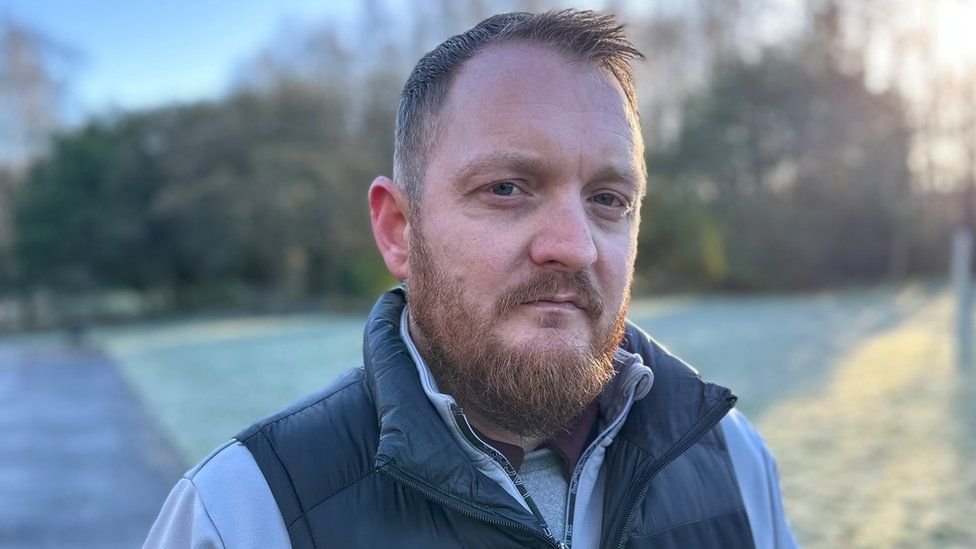-

-
-
Loading

Loading

Daniel Thomson, a 37-year-old man from Glasgow, has been living a life of "sofa surfing" for the past four months. Despite working 50 hours a week in a chip shop, he is unable to find affordable housing in his home city. As a result, his only option, according to local housing groups, is to stay in one of Glasgow's homeless hostels. Daniel is part of a growing population in Scotland referred to as "core homelessness," which includes individuals living in hostels, rough sleeping, or relying on the generosity of friends. Homeless charity Crisis recently revealed that 18,400 households find themselves in this situation each day of 2022. Disturbingly, this number is expected to rise by a third by 2026. Daniel became homeless after a relationship breakdown last year and now spends his days uncertain about where he will spend the night, often relying on friends or his ex-partner. However, he finds it embarrassing and detrimental to his mental health to repeatedly ask for a place to stay. Daniel's only hope of finding a place of his own is through his local authority, but so far, he has not been offered temporary accommodation despite seeking assistance from five local housing associations. Although the tests for "priority need" were abolished in 2012, Daniel claims he was informed that his circumstances needed to change before he would have a chance at securing a home. The housing authorities told him that without disabilities, drug addiction, or a higher position on the waiting list, he would remain at the bottom indefinitely. Furthermore, Daniel discovered that the homeless team could provide him with temporary accommodation in a hostel for a substantial nightly fee of £100 - an amount he cannot afford. He expressed his concern regarding accumulating debt and the mental toll it would take to pay such a high price for a temporary solution while trying to secure a home through a housing association. These circumstances arise less than two months after Glasgow City Council's declaration of a housing emergency. The homeless situation in Scotland is worsening, with Crisis reporting a 124% increase in the use of homeless bed-and-breakfast establishments since the onset of the Covid-19 pandemic. Despite this, Glasgow City Council aims to save £4.9 million in its homelessness budget by phasing out these hotels. Moreover, concerns have been raised about drug-related deaths within the city's hostels, with Daniel revealing that his own brother died in homeless accommodation last July. Daniel is determined to avoid staying in a hostel due to the prevalence of drugs and the potential loss of contact with his daughter. He finds it unfair that working individuals are given no priority, pushing him to the bottom of the waiting list, resulting in him being on the streets while paying taxes to the government. Crisis released their Homelessness Monitor report this week, indicating a 132% surge in rough sleeping in England since 2010 and an 11% rise in "core homelessness" in Scotland since 2020. These figures are projected to increase by 33% due to a scarcity of social housing, rising private rent costs, and the pressures of living expenses. Dr. Beth Watts-Cobbe from Heriot-Watt University expressed concern over these trends and emphasized the importance of a comprehensive response from policymakers to prevent further increases in homelessness. Crisis has urged the Scottish government to provide assistance up to six months before individuals are at risk of homelessness, alongside implementing new legal obligations for public services to play a more significant role in preventing homelessness. These recommendations are anticipated to be included in the forthcoming Housing Bill, which enjoys support from Crisis and other charitable organizations. Housing Minister Paul McLennan stated that the government has already committed to many of these measures in its homelessness strategy, aiming to reduce the number of households in temporary accommodation. However, he acknowledged that certain changes that could significantly impact the situation are beyond the Scottish government's jurisdiction. He called on the UK government to heed Crisis's calls to increase Housing Benefit and other working-age benefits, expressing concern about an upcoming Local Housing Allowance freeze. The UK government spokesperson emphasized that £2 billion is being allocated to tackle rough sleeping in England, citing the Single Homelessness Accommodation Programme's plan to deliver 2,400 homes for rough sleepers by March 2025. They assured that efforts to completely eradicate rough sleeping are underway through the Rough Sleeping Strategy. Anyone affected by the issues discussed in this article is encouraged to share their experiences with the BBC by emailing haveyoursay@bbc.co.uk.